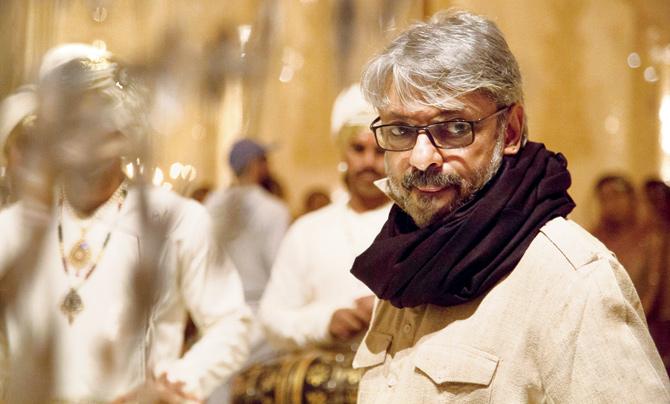Most mainstream filmmakers, like politicians, appeal to the basest human emotions, polarising the narrative between good and evil


Sanjay Leela Bhansali on the set of one of his films
 Movies, it can be argued, like people, have a gender. They can be both male and female in turns, but are often either for the most part. Deeply aesthetic, painstakingly beautiful, from the point of view of interior décor, cinematography, costume design —chiefly expensive bridal wear (Devdas, Bajirao Mastani, etc) — maudlin in its melodrama, Sanjay Leela Bhansali's films (and we must call them cinema in its rare big-screen connotation) have inevitably attracted more female admirers than male, although I'm basing this purely on anecdotal evidence, and remain quite unsure if his films might pass the all-important Bechdel Test (on gender equality).
Movies, it can be argued, like people, have a gender. They can be both male and female in turns, but are often either for the most part. Deeply aesthetic, painstakingly beautiful, from the point of view of interior décor, cinematography, costume design —chiefly expensive bridal wear (Devdas, Bajirao Mastani, etc) — maudlin in its melodrama, Sanjay Leela Bhansali's films (and we must call them cinema in its rare big-screen connotation) have inevitably attracted more female admirers than male, although I'm basing this purely on anecdotal evidence, and remain quite unsure if his films might pass the all-important Bechdel Test (on gender equality).
ADVERTISEMENT
And, yet, for the first time, I find women feeling a tad uneasy as they step out of Bhansali's Padmaavat, formerly known as Padmavati, which should ideally have been titled Khilji, given this is as much a film centred on the wild antagonist, Sultan Allauddin Khilji (Ranveer Singh), as Christopher Nolan's The Dark Knight was on the Joker (Heath Ledger).
Most female film reviewers I follow have been uncharacteristically uncharitable towards the film (this is also a first). And one popular actor (Swara Bhaskar) has come out strongly against it in a lucid blog (which is a first of sorts as well). It isn't that they don't acknowledge the fine performances in the picture (Singh's crazy antics, or Deepika Padukone's expressly emotive eyes), or the grandness on display that you walk into a Bhansali production for anyway. I suspected, and it's seemingly clear, the reservations have to do with where all of this is leading up to — the final sequence, inspired by the climax of Ketan Mehta's Mirch Masala, wherein a group of Rajasthani women (from 14th Century), protect the Chittor fort, throwing coals on fire, and their own bodies into it, committing 'jauhar' (mass suicide). This is part of the original story Padmaavat, written by the Sufi poet Malik Mohamed Jayasi in the mid-1500s, and I'm assuming also the French ballet opera, Padmavati, that's been running since the 1920s, and that Bhansali himself directed on stage in Paris in 2008.
What is it about the well-known jauhar scene that instantly irks a lot of women (as I'm sure men too)? That it appears without an apology; but for an explicit, token rider (in the beginning of the film) that the filmmakers do not condone the once prevalent practice? Isn't all art (at a conscious or sub-conscious level) commentary of some sort? I suspect so. Is silence on a matter a telling comment too? Ask any veteran politician that, and you'll know the answer (especially if the question's why India's major political parties didn't speak a word against bigots opposing Padmaavat's release, without even seeing the film).
Does Bhansali genuinely glorify mass suicide of women? In the same way that he deliberately exaggerates Rajput valour and self-worth (or Maratha, Gujarati pride in Bajirao Mastani, Goliyon Ki Raasleela Ram-Leela). This only seems partly fictional when you gawk at some cowards from the community attacking little kids over a movie, and wonder, if the Rajputs were really that great, whatever happened to their progeny? Of course, they all look silly now that it's clear Bhansali's magnum opus is really an effort at gently massaging the protesting Rajput ego. The caste group, Karni Sena, should really be celebrating this film. As some of their saner members already do.
What's the moral of this story then? That we inevitably take Mr Bhansali's politics more seriously than he does himself. He, self-admittedly, attempts to make a 'Mughal-e-Azam' — a film he grew up watching again and again, upon his dad's insistence, as a child. This effectively means his technicolour (or now IMAX, 3D) dreams equal the budget of a healthy municipality. How does one corner crowds to recover such huge costs? Like any mainstream politicians will tell you, by appealing to basest human emotions — love, hate, imagined pride, honour. And polarising a fable-like narrative, between 'good' and 'evil'. This also makes it hard to decouple the good that is now considered evil — but only sometimes.
So Khilji, the Muslim invader, is pure savage (without a shade of grey). Raja Ratan Sen, the righteous Hindu king, is a great man, beyond human comprehension. It hardly matters that in the original story, it was a Hindu prince (Devapal of Kumbhalner), having fallen for Padmavati as well, who kills Ratan Sen. Should facts and nuance get in the way of a palatably simplistic, sure-shot blockbuster story? Ideally not. Did I love the film for what it was originally intended to be — a sandal-and-sword spectacle? Totally.
While a young intern, right out of college, peeing at a hotel loo, during the post-premiere party for Devdas at the Taj in Colaba, is when I accidentally learnt about Mr Bhansali's ambitions as a filmmaker. "King of the world," I heard someone exult, turned to my right. That was Mr Bhansali, quoting Leonardo DiCaprio's line from Titanic (later James Cameron's Oscar speech) to himself, reveling in the glory of Devdas's successful first show — peeing in the urinal next to mine! Fair enough. Titanic was as much about class divide and maritime history as Mughal-e-Azam (with the imagined Anarkali) is a chronicle of the Mughal empire.
Mayank Shekhar attempts to make sense of mass culture. He tweets @mayankw14 Send your feedback to mailbag@mid-day.com
 Subscribe today by clicking the link and stay updated with the latest news!" Click here!
Subscribe today by clicking the link and stay updated with the latest news!" Click here!







